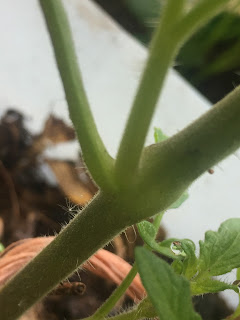Tomatoes to Market, The cutthroat world of farmers markets and selling produce Week 1
 We have a group of 3rd graders who grew a LOT of tomatoes as a school project. Now they are trying to get those tomatoes to market to sell. We are learning a lot.
We have a group of 3rd graders who grew a LOT of tomatoes as a school project. Now they are trying to get those tomatoes to market to sell. We are learning a lot.Farming is a lot of hard work. There are early mornings and late nights; sweat dripping from your brow as you...fill out paperwork. Yes, one of the hardest parts about farming is becoming paperwork and politics. Let's be honest, growing stuff has been around for thousands and thousands of years. We know how to get a seed to pop up out of the ground and there is pretty much a formula for making those plants yield something edible. That is the easy part.
The Last Mile Problem
The hard part what is often called the "last mile problem". A phrase mostly used for telecommunications, it applies here because like a great many things, we are seeing that the hardest part of doing something is not learning to do the thing or doing the thing, but getting the thing that you produce out into the world. I have shown students how to compost and create rich organic chemical free soil. I have taught them how to save seeds, plant seeds, grow plants, and soon, harvest those crops, but the hardest part of this whole thing will be getting a great deal of tomatoes to people who can buy and or eat them and not for the reasons you think; the last mile.
One of the keys to my profession over the past few years has been solving the first mile problem (getting people to grow) and the last mile problem (getting what they have grown to market). By far, the hardest part is the last mile for a number of reasons.
The nominal reasons... Food safety.
To start with, food can be dangerous so people in the government got together to try to make sure that people could not intentionally or accidentally kill people or make them sick. We as a society have decided to place regulations in place to secure against that. Easy, right?
The problem is that the process has gotten more and more complicated. There are not only federal regulations, but state and local regulations as well to be waded through. If we go back to the beginning we are even forced to work on zoning for our "urban farm". What can we grow and where. We will talk about chickens later, but one of the recent rubs is that to grow food on your front lawn, for example, can be illegal if it violates city codes on appearance.
To be honest, not even that is a big deal. The biggest deal could be the more raw politics of it all.
The Farmers Market
 The farmers market is, for many, the easiest way for one to sell something that they have grown or made. It is pretty convenient to gather people all at one time, giving buyers a central location to come and get produce from their local grower.
The farmers market is, for many, the easiest way for one to sell something that they have grown or made. It is pretty convenient to gather people all at one time, giving buyers a central location to come and get produce from their local grower.It is a tried and tested model that is increasingly working against the small grower. Larger vendors are able to have more success because their booths are brighter and shinier. It is shallow but effective. These vendors occupy that odd space in the middle where a lot of people are very comfortable. They are the big fish in the small pond. Worse yet are the larger vendors who are able to buy produce in bulk from wholesalers and bring them to market to sell. A lot of market managers do not have the means or the time to investigate the origins of the produce.
Then there are the small scale politics. These are based on the quasi-apocryphal stories that you hear that float around these markets. So and so doesn't like so and so and for that reason they are not allowed at the market or they are given a bad lot at the market or are punished in some way for not being friends with so and so.
The application process can be a small scale nightmare too. Farmers markets are essentially a show that people put on every weekend or so. It has to look quaint but maybe not too much so. It has to have elements of professionalism. So applying for a market can be based on a number of things. Who you know and who knows you. Some might argue that defeats the purpose. What kind of show can you put on? How many twitter followers do you have? What is your website? Having something delicious and nutritious to sell may not be the end. You have to have a gimmick.
A well and fair run farmers market can be a lot of fun and profitable but in some cases it is like trying to be the new kid at the school trying to sit with the cool kids at lunch time. So we are embarking on an interesting mission to get these tomatoes to market by August and keep this project going.
If you would like to support what we are doing, you can make a donation to help out, here: paypal.me/sunandrainfarm
You can follow us on Twitter at Sunandrainfarm
You can follow us on Instagram at thelifecoop
You can send us an email at sunlightandrainfarm@gmail.com


Comments
Post a Comment